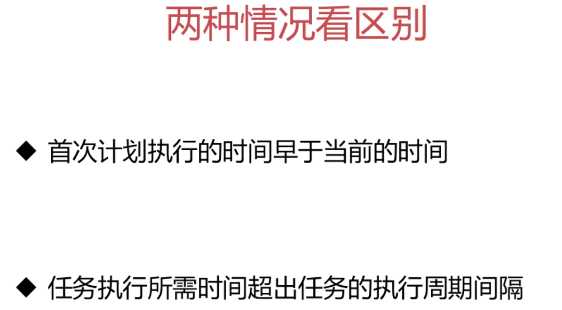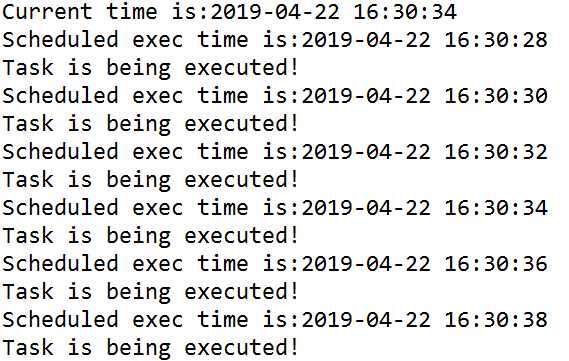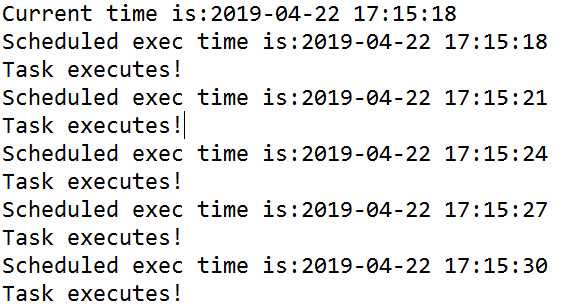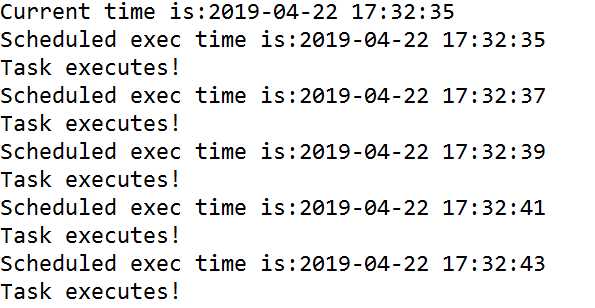定时任务调度工作(学习记录 四)schedule与scheduleAtFixedRate的区别
Posted xk920
tags:
篇首语:本文由小常识网(cha138.com)小编为大家整理,主要介绍了定时任务调度工作(学习记录 四)schedule与scheduleAtFixedRate的区别相关的知识,希望对你有一定的参考价值。

根据两种情况来看区别
一.首次计划执行的时间早于当前的时间
1.schedule方法
“fixed-delay”:如果第一次执行时间被延迟了,随后的执行时间按照上一次实际执行完成的时间点进行计算
演示:
public class DifferenceTest { public static void main(String[] args) { //规定时间格式 SimpleDateFormat sf = new SimpleDateFormat("yyyy-MM-dd HH:mm:ss"); //获取当前的具体时间 Calendar calendar = Calendar.getInstance(); System.out.println("Current time is:" + sf.format(calendar.getTime())); //设置成6秒前的时间,若当前时间为2019-04-22 15:44:50 //那么设置之后的时间变成2019-04-22 15:44:44 calendar.add(Calendar.SECOND, -6); Timer timer = new Timer(); //第一次执行时间为6秒前,之后每隔两秒钟执行一次 timer.schedule(new TimerTask() { @Override public void run() { // 打印当前的计划执行时间 System.out.println("Scheduled exec time is:" + sf.format(scheduledExecutionTime())); System.out.println("Task is being executed!"); } }, calendar.getTime(),2000); } }
执行效果:

2.scheduleAtFixedRate方法
“fixed-rate”;如果第一次执行时间被延迟了,随后的执行时间按照上一次开始的时间点进行计算,
并且为了赶上进度会多次执行任务,因此TimerTask中的执行体需要考虑同步。
演示:
public class DifferenceTest { public static void main(String[] args) { //规定时间格式 SimpleDateFormat sf = new SimpleDateFormat("yyyy-MM-dd HH:mm:ss"); //获取当前的具体时间 Calendar calendar = Calendar.getInstance(); System.out.println("Current time is:" + sf.format(calendar.getTime())); //设置成6秒前的时间,若当前时间为2019-04-22 15:44:50 //那么设置之后的时间变成2019-04-22 15:44:44 calendar.add(Calendar.SECOND, -6); Timer timer = new Timer(); //第一次执行时间为6秒前,之后每隔两秒钟执行一次 timer.scheduleAtFixedRate(new TimerTask() { @Override public void run() { // 打印当前的计划执行时间 System.out.println("Scheduled exec time is:" + sf.format(scheduledExecutionTime())); System.out.println("Task is being executed!"); } }, calendar.getTime(),2000); } }
执行效果如下:

如图,因为设置了每隔2s执行一次,第一次执行时间比当前时间提早了6s,所以它会从原定最早的时间,先直接执行三次,来追上现在的进度。
二.任务执行时间超出执行周期间隔
1.schedule方法
下一次执行时间相对于上一次实际执行完成的时间点,因此执行时间会不断延后。
演示:
public class DifferenceTest { public static void main(String[] args) { //规定时间格式 SimpleDateFormat sf = new SimpleDateFormat("yyyy-MM-dd HH:mm:ss"); //获取当前的具体时间 Calendar calendar = Calendar.getInstance(); System.out.println("Current time is:" + sf.format(calendar.getTime())); Timer timer = new Timer(); //第一次执行时间为6秒前,之后每隔两秒钟执行一次 timer.schedule(new TimerTask() { @Override public void run() { try { Thread.sleep(3000); } catch (InterruptedException e) { // TODO Auto-generated catch block e.printStackTrace(); } // 打印当前的计划执行时间 System.out.println("Scheduled exec time is:" + sf.format(scheduledExecutionTime())); System.out.println("Task executes!"); } }, calendar.getTime(),2000); } }
执行结果:

用sleep,模拟执行任务时间为三秒,大于任务间隔时间。
2.scheduleAtFixedRate方法
下一次执行时间相对于上一次开始的时间点,因此执行时间一般不会延后,因此存在并发性。
演示:
public class DifferenceTest { public static void main(String[] args) { //规定时间格式 SimpleDateFormat sf = new SimpleDateFormat("yyyy-MM-dd HH:mm:ss"); //获取当前的具体时间 Calendar calendar = Calendar.getInstance(); System.out.println("Current time is:" + sf.format(calendar.getTime())); Timer timer = new Timer(); //第一次执行时间为6秒前,之后每隔两秒钟执行一次 timer.scheduleAtFixedRate(new TimerTask() { @Override public void run() { try { Thread.sleep(3000); } catch (InterruptedException e) { // TODO Auto-generated catch block e.printStackTrace(); } // 打印当前的计划执行时间 System.out.println("Scheduled exec time is:" + sf.format(scheduledExecutionTime())); System.out.println("Task executes!"); } }, calendar.getTime(),2000); } }
执行结果如下:

不会被任务执行所需要时间影响。
以上是关于定时任务调度工作(学习记录 四)schedule与scheduleAtFixedRate的区别的主要内容,如果未能解决你的问题,请参考以下文章